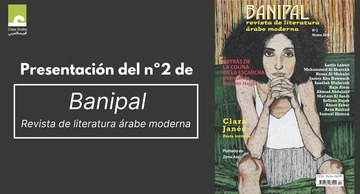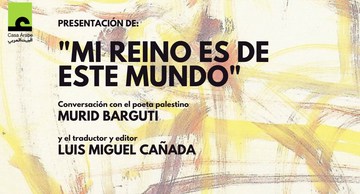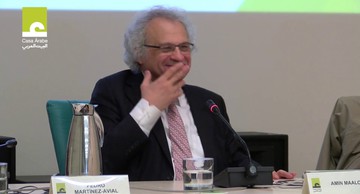

Al-Tanki, in the Footsteps of an Iraqi Woman (ARABIC)
نشرت 26 مايو 2022
ALL VIDEOS IN THIS CATEGORY
-
Al-Tanki, in the Footsteps of an Iraqi Woman (ARABIC)
Casa Árabe and Ediciones del Oriente y del Mediterráneo are presenting Alia Mamduh's most recent work on Wednesday 1 June in Madrid. The event will feature the author of the book, Alia Mamduh, who will be accompanied by her translator and prologue writer, Ignacio Gutiérrez de Terán, professor of Arabic and Islamic Studies at the Autonomous University of Madrid. This bewildering symphony of disparate narrative voices draws us into the search for Afaf, the Iraqi painter whose traces are lost in Paris. The Iraqi writer who has lived in France for decades has long been experimenting with the Arabic language, trying to generate a peculiar way of expressing her life experience as an exiled Arab woman who returns again and again, paradoxically, to her native country. Writing about the violence, dictatorships and invasions that forced her to leave; about the marginalisation that women continue to suffer in the cities and towns of Iraq in the shadow of the omnipotent power exercised by the man, the father, the elder brother or the great military, civil and religious leader; or about the repression of basic freedoms, starting with freedom of expression and ending with sexual freedom. All this comes to the surface from the very first page of this detailed account of an Iraqi family and the street where its members live, in spite of a Baghdad that languidly declines... (from the presentation by Ignacio Gutiérrez de Terán) Al-Tanki's publishing novel is complemented by the reissue of Alia Mamduh's previous novel, Naphthalene, also published by Ediciones del Oriente y el Mediterráneo in 2000, in which her play of subtlety, acidity and linguistic distortion both confuses and uncovers the tragic experience of millions of Iraqis forced to leave their homeland.نشرت 26 مايو 2022 -
The Historical Figure Wallada: Poetry and freedom (ARABIC)
Syrian poet Maram al-Masri and Arabist Inmaculada Serrano will be giving us a closer look at a series of female historical figures who have played key roles in Cordoba’s history. This time they will be doing so at our headquarters in Cordoba on February 23. We will be closely examining these women’s social, cultural, political and economic contributions throughout the era of Al-Andalus, and more specifically during the period from the ninth to fifteenth centuries, with the help of Inmaculada Serrano. As for Maram al-Masri, author of the book El retorno de Wallada (“Wallada’s Return”), she will be focusing on the historical figure of Wallada, a princess from Cordoba, through a series of poems in Arabic. To al-Masri, Wallada represents an archetype of great modernity because she believes that, when Muslim women feel attracted by the obscurantism in certain kinds of fundamentalism, we must urgently bring up Wallada’s “return,” because this poetess from Al-Andalus continues to stand as a model of freedom conquered through words and love. Maram al-Masri. A Syrian poet, after studying English literature in Damascus, she settled in Paris. The author of several poetry books, she won the Adonis Prize awarded to the best Arab Creative Work in 1998 by the Lebanese Cultural Forum, with “Red Cherry on White Tiles” (1997) . One of the topics she most commonly explores is women’s freedom, as highlighted in her book “Wallada’s Return” (2007), in which she rediscovers this female poet from Al-Andalus. Al-Masri has also authored short stories published in both Arab and European literary magazines. She has take part in international poetry festivals in several countries. She came to Cordoba to attend the Cosmopoética Festival in the year of 2011. In 2016, she wrote “Love in Times of Insurrection and War: An anthology of today’s Syrian poetry,” in which she compiled and translated works by contemporary Syrian poets. Inmaculada Serrano. An Arabist and Spanish Language and Literature teacher at the San Álvaro Institute in Cordoba, she has been an Arabist since 2007, when she began her work to complete research on the female writers of of Al-Andalus in order to increase awareness about them through teaching. She later expanded her studies to include all of the female historical figures who stood out in Cordoba’s history in any social or cultural arena. She has given countless gender-based tours in Cordoba while cooperating with various entities, the most notable of which have been the Cordoba Delegation of Education and Science, the Cordoba Center for Teachers and the Casa Árabe headquarters in Cordoba. Photo: Abene Sebei on Pexels Further information: https://en.casaarabe.es/event/the-historical-figure-wallada-poetry-and-freedomنشرت 22 فبراير 2022 -
Presentación de Banipal nº2
Tras la aparición, en primavera del 2020, del número 1 de Banipal. Revista de literatura árabe moderna llega ahora el segundo ejemplar. El viernes 16 de octubre, Casa Árabe ofrece una conversación con Margaret Obank, su directora, y el redactor jefe Samuel Shimon, acompañados por otras personalidades vinculadas a este número. Podrá verse en nuestro canal en Youtube. Junto a Obank y Shimon, conversaremos con Joselyn Michelle Almeida, miembro del Consejo de redacción de la revista, así como con Ahmad Abdulatif, novelista egipcio cuya novela Elías tiene un fragmento en el número 2, quien estará acompañado por la traductora de su obra Covadonga Baratech. Creada en Inglaterra en 1997 por Margaret Obank y el iraquí Samuel Shimon, el nombre de la revista hace honor a Asurbanipal, el último gran rey de Asiria, quien fundó la primera biblioteca del mundo en Nínive. El objetivo inicial era compensar el déficit de literatura árabe en el mundo anglosajón y reflejar la escena literaria árabe actual para el lector y los editores. Más de 22 años de recorrido han ayudado a crear un cambio importante en las actitudes hacia la traducción de la literatura árabe al inglés y del inglés a otros idiomas. Ahora llega el turno de abrirse de la lengua de Shakespeare a la de Cervantes. De su recorrido y de esta apertura importante hacia el espacio hispanófono hablaremos con algunos de los protagonistas de Banipal no. 2., que cuenta con una portada de la pintora libanesa Zena Assi, además de cuentos, poemas, fragmentos de novela y reseñas, complementados con fotografías de figuras literarias. Esta actividad se celebra coincidiendo con la Feria de Libro de Madrid, que en esta ocasión y debido a la situación sanitaria tiene lugar íntegramente online. Más información: https://www.casaarabe.es/eventos-arabes/show/presentacion-de-banipal-n%C2%BA2نشرت 27 اكتوبر 2020 -
Presentación de "Mi reino es de este mundo", de Murid Barguti
Casa Árabe y la Fundación Tres Culturas del Mediterráneo presentan esta obra en una conversación con su autor, el poeta palestino Murid Barguti, y el traductor y editor Luis Miguel Cañada. Introducen el acto Karim Hauser, coordinador de Relaciones Internacionales de Casa Árabe, y Olga Cuadrado, directora de la biblioteca "Fátima Mernissi" de la Fundación Tres Culturas del Mediterráneo. Además de "Medianoche", considerada la cima de su producción, la presente antología publicada por Ediciones del Oriente y del Mediterráneo y seleccionada con la colaboración del autor, reúne más de medio centenar de poemas publicados entre 1980 y 2018, ofreciendo una panorámica casi completa de su producción. «El título que agavilla esta antología bilingüe, "Mi reino es de este mundo" (Mamlakati min hada al-alam), evoca inevitablemente la respuesta de Jesús al ser preguntado por Pilato si en efecto él era el rey de los judíos (Juan, 18: 33-37). Pero más allá de esa asociación, quiere traducir la lengua realista, material y terrera, la lengua actuante con la que Barguti ha edificado toda su obra, en prosa y verso, por tierras de cardamomo y café. Una obra que aspira a crear belleza con la palabra, que busca acompañar, consolar, denunciar, protestar; gritar y dar fe de amor a las cosas grandes y pequeñas, a menudo inadvertidas, desplegando para ello los secretos de la tierra». Más información: https://www.casaarabe.es/eventos-arabes/show/mi-reino-es-de-este-mundoنشرت 09 اكتوبر 2020 -
Encuentro con el escritor Amin Maalouf en Casa Árabe (FRANCÉS)
Casa Árabe y Alianza Editorial organizaron este evento el miércoles 23 de octubre de 2019 en Madrid, con motivo de la publicación de "El naufragio de las civilizaciones". En el encuentro, el escritor Amin Maalouf dialogó con el periodista de El País Guillermo Altares. El acto fue presentado por Pedro Martínez-Avial, director general de Casa Árabe. El evento se retransmitió en directo en nuestro canal de Youtube. Hace unos años, Amin Maalouf nos hablaba de que "nuestras civilizaciones se agotan" en "El desajuste del mundo" y en" Identidades asesinas", y aportaba las razones: la desconfianza hacia el "Otro", la xenofobia, la intolerancia política y religiosa, el populismo, el individualismo y la insolidaridad del nacionalismo, el racismo... Hoy en día ya nos habla directamente de "naufragio inminente". No hay añoranza de un pasado mejor en sus palabras, solo le preocupa el futuro de esta "época desconcertante", el porvenir de las nuevas generaciones, que pueda desaparecer lo que ha dado sentido a la aventura humana. Tampoco se deja llevar por el pesimismo ni quiere predicar el desaliento, solo hace una llamada lúcida a la responsabilidad colectiva, dejando entreabierta la puerta de la esperanza a que el mundo vuelva a orientarse, ya que como escribió en su novela "Los desorientados": "Más vale equivocarse en la esperanza que acertar en la desesperación". Amin Maalouf (Beirut, 1949) nace en el seno de una familia árabe cristiana y, siguiendo una larga tradición familiar, se dedica inicialmente al periodismo en el diario libanés "An Nahar", en algunos casos como corresponsal de guerra. En 1975, tras el estallido de la guerra civil libanesa, Maalouf se exilia a Francia, donde vive con su familia desde entonces. Con la publicación de su ensayo "Las Cruzadas vistas por los árabes" en 1983, decide dedicarse a la escritura (ensayo y novela, principalmente). La mayoría de los libros de Maalouf se desarrollan en un entorno histórico y en ellos combina hechos reales con fantasía y conceptos filosóficos. Sus textos, escritos con la habilidad de un auténtico maestro de la narración, ofrecen una visión refinada y sensible de los valores y actitudes de las diferentes culturas de Oriente Medio, África y el mundo mediterráneo. Maalouf ha recibido el premio Maison de Presse por su novela "Samarcanda" y el Goncourt por "La roca de Tanios". Ambas fueron publicadas por Alianza Editorial en 1989 y 1994, respectivamente, junto al resto de su obra: "León el Africano" (1989), "Las cruzadas vistas por los árabes" (1989), "Los jardines de Luz" (1991), "El primer siglo después de Beatrice" (1993), "Las escalas de Levante" (1997), "Identidades asesinas" (1999), "El viaje de Baldassare" (2000), "El amor de lejos" (2002), "Orígenes" (2004), "El desajuste del mundo" (2009) y "Los desorientados" (2012). En 2010 obtuvo el Premio Príncipe de Asturias de las Letras y es miembro de la Academia Francesa. Sus textos han sido traducidos a más de veinte idiomas. http://www.casaarabe.es/eventos-arabes/show/encuentro-con-amin-maaloufنشرت 30 اكتوبر 2019





